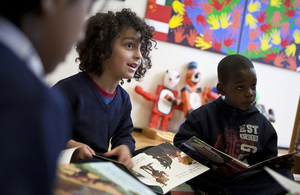New action plan to inspire thousands more pupils to read
New funding for book clubs and a drive to get every primary school child a library card announced

Children reading
A new action plan to help improve reading standards in primary schools, including new funding for book clubs, has been announced by School Reform Minister Nick Gibb to mark World Book Day.
Raising reading standards in schools, so that every child has the skills necessary to succeed in life, is a key part of the government’s plan for education.
The latest figures show that a record proportion of children (89%) reached the expected standard of reading at age 11 (key stage 2) demonstrating that the government’s reforms are working.
However, this standard has historically been set too low. One in 5 children still leaves primary school unable to read at a standard that will ensure they are well placed to succeed at secondary school - representing thousands of pupils who are leaving primary school underprepared.
The government is determined to ensure that even more primary school pupils achieve a firm grasp of reading and are given the opportunity to experience the pleasure and enrichment that comes from the world of books. To address this, the Department for Education has today published a new plan, aimed at schools, that clearly sets out the government’s ambition for reading.
‘Reading: the next steps’ outlines new measures, including:
- a new programme to support up to 200 primary schools, where reading attainment at key stage 2 is currently low, to set up book clubs and promote library membership, to inspire thousands more pupils to develop a love of literature
- urging all primary schools to arrange library membership for all their year 3 pupils (age 7 to 8)
- boosting the promotion of poetry in schools by funding new resources to help primary teachers to introduce poetry recitation to their pupils at an early age, as well as funding a further year’s extension of the national poetry recitation competition, Poetry by Heart
On World Book Day, School Reform Minister Nick Gibb said:
Nothing is more important than ensuring every child can read well. Poor reading can hold people back throughout their adult lives, preventing them from achieving their full potential.
Our plan for education is focused on ensuring all children leave primary school with a good grasp of literacy and develop a love of reading.
This approach is working: the proportion of 6-year-olds achieving the expected standards in the phonics screening check has risen from 58% to 74% between 2012 and 2014. That is equivalent to 102,000 more children doing well.
But our ambition is to go further, to improve fluency, exposure of pupils to great literature, and to instil the habit of regular reading. The measures outlined today are designed to build on the progress made so far and help primary schools in the vital role they play in driving up literacy standards across England.
The plan builds on the measures already introduced by the government to boost literacy and to get more children reading including:
- setting high expectations for every age through the new national curriculum for primary and secondary schools that came into force in September 2014
- strengthening the requirement in primary schools to teach children to read through systematic synthetic phonics, since evidence shows this is the most effective approach to early reading
- introducing a phonics screening check at age 6. The first 3 years of the check have enabled teachers to identify nearly 568,000 6-year-olds who needed extra support. The results from this year’s phonics check show that since its introduction 102,000 more 6-year-olds (based on 2014 figures) are on track to become confident readers
- boosting the quality of phonics teaching, by providing £23.7 million in match funding to over 14,000 primary schools, enabling them to buy systematic synthetic phonics products and training
- placing a greater focus on grammar, spelling and punctuation, with a new test for 11-year-olds and a strengthened requirement in GCSEs to use accurate spelling and punctuation
- introducing a catch-up premium for year 7 pupils who have not achieved level 4 at key stage 2 in reading, worth £500 per pupil. This enables secondary schools to deliver additional support, such as individual tuition or intensive support in small groups, for those pupils that most need it
Notes to editors:
- The policy paper ‘Reading: the next steps’ is available on GOV.UK.
- The government is announcing today (5 March 2015) funding of £100k for a new programme that will support up to 200 primary schools, where reading attainment at key stage 2 is currently low, to set up book clubs and promote libraries. The book clubs will give children the chance to discuss in a non-classroom setting the books they have read and to develop their love of literature through discovering new authors and new stories.
- The programme, which the government will be inviting organisations to tender for, will offer information and advice to any school interested in running a book club, and will work directly with schools where reading attainment is currently low to help them set up clubs. Organisations interested in this contract should register with Redimo, the department’s e-procurement system, where it will be advertised on 12 March. Further information on Redimo is available on GOV.UK.
- The department funds Poetry by Heart to deliver a national schools poetry recitation competition. The competition is for pupils in years 10 to 13 and is run by Sir Andrew Motion and the Poetry Archive. The department is providing £570,000 of funding for the year 2014 to 2015. 1155 schools/colleges have registered to use the resources and 333 schools/colleges are taking part in the competition.
DfE media enquiries
Central newsdesk - for journalists 020 7783 8300